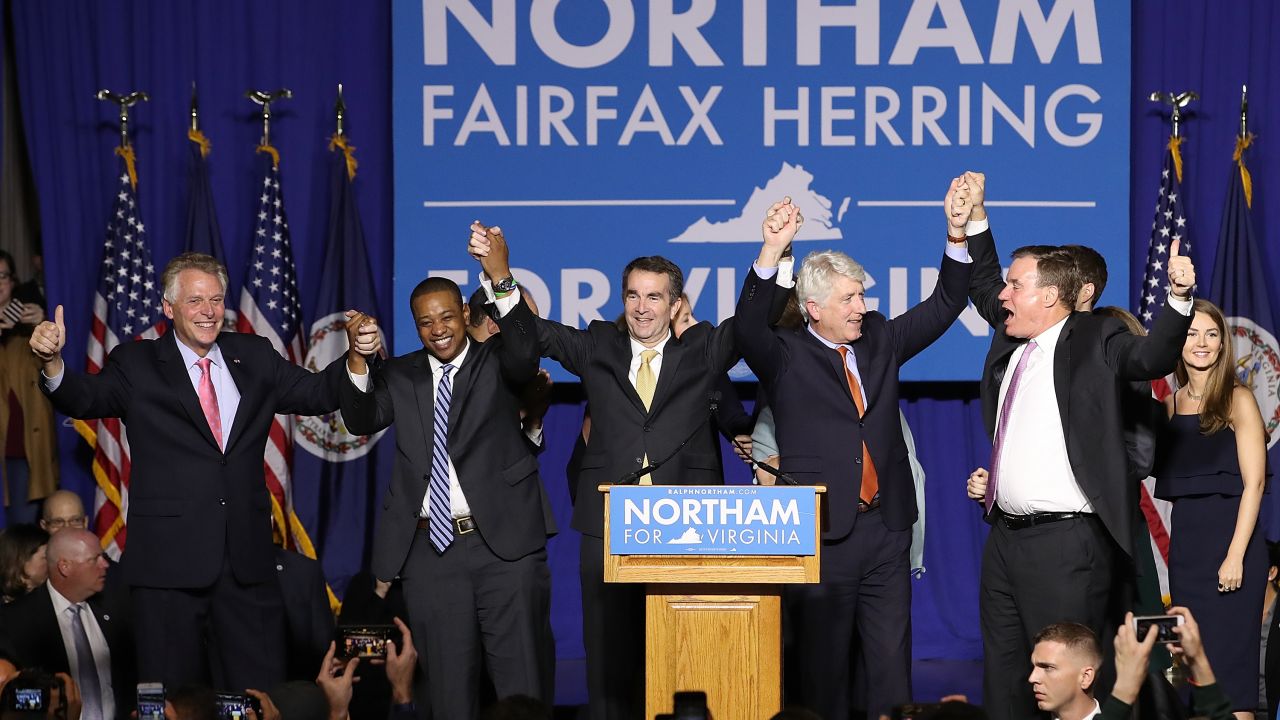
Gov.-elect Ralph Northam (enter) links arms with (left to right) current Gov. Terry McAuliffe, Lt. Gov.-elect Justin Fairfax, Attorney General-elect Mark Herring, and U.S. Sen. Mark Warner (D-VA) at an election night rally Nov. 7, 2017 in Fairfax, Virginia. Northam defeated Republican candidate Ed Gillespie by nearly 9 points. (Photo by Win McNamee/Getty Images)
This post originally appeared at Medium.
Election night 2017 was a resounding victory for America’s progressive future. Win after win blossomed all over the nation — not only in our statehouses, but also on key issues from criminal justice reform in Larry Krasner’s victory as Philadelphia District Attorney, to anti-corruption initiatives in New York, to Medicaid expansion in Maine.
In every race, the American people came out and stood up for what matters most to them, and to defend the rights under siege. The success of these contests for power at every level are nothing short of a rallying cry for Democrats, and a warning shot for Republicans everywhere.
In the light of day, there are still lessons to be learned from Tuesday night — and specifically from the most-watched races in Virginia. Here is what we are taking away from elections in a historically swing state that saw white supremacists march in the streets this summer, but last night convincingly reclaimed their community’s values.
1. The Democratic base is fired up.
Across Virginia, it was clear that bold, progressive campaigns appeal to not only the Democratic base, but also to swing voters. Some of the most overlooked and crucial blocs to watch in progressive politics — black women, millennials, Latinx and Asian voters — voted overwhelmingly for Northam in Virginia, and came out in droves. People of color also had the opportunity to vote for a more reflective democracy, with Justin Fairfax becoming the second African-American liutenant governor in Virginia history. The victory was especially sweet, as it came against a Republican nominee who pushed voter-ID, voter purges and discriminatory gerrymandering.
In two key northern Virginia districts, led in significant part by the Caring Across Generations Action Fund and the Working Families Party’s efforts, progressive women of color defeated incumbents, in part by lifting up issues of senior care and caregiving in their campaigns. Raising that message, and having the message echoed by independent groups talking to thousands of voters about their experiences with care, allowed strategic breakthroughs with pockets of moderate and progressive voters who — motivated by outrage at the Republican-led efforts to repeal the Affordable Care Act — connected to a down-ballot Democratic candidate they might otherwise have ignored.
Republicans have always respected the enthusiasm of their base more than Democrats, but this time — and going forward — it’s abundantly apparent that the base will refuse to be ignored.
For the future: Democrats, you can’t take your base for granted. Base enthusiasm wins elections, and the rules (like restoring voting rights to 168,000 formerly incarcerated citizens) matter.
2. An inclusive populism wins — and should be even stronger.
Those of us outside of Virginia were fretting over Northam’s nebulous message, it’s true — and the economic message could have been clearer, earlier. But a look at Northam’s campaign ads shows that the dominant through-line (other than his appealing biography) was inclusiveness for a diverse, prosperous Virginia.
While Gillespie was creating an “us” versus “them” that fell on the most cynical racial lines, Northam projected an inclusive “us” with strong critiques of the travel ban and deportations, and made “them” the lobbyist class on issues like student debt, clean air and offshoring jobs. According to locals, the misguided, last-minute recapitulation on sanctuary cities didn’t break through to most voters — but it was a textbook Democratic mistake, playing on the opponent’s turf. The majority of Americans oppose the mass deportation strategy of the Trump Administration, and Democrats need to show voters of all races that they have courage to stand up for what’s right.
For the future: Democrats have to recognize the populist moment, and authentically speak to the concerns of a multiracial working and middle class. Demos and Demos Action are launching a new project to offer candidates across the country policy ideas for an inclusive populism that takes our economy and democracy back from the wealthy and powerful to create a racially just America where everybody matters.
3. Contested elections — including primaries — are good for the party.
One of the heroes of the Virginia story was Tom Perriello, a progressive gubernatorial primary candidate whose early embrace of $15 an hour, debt-free college and democracy reforms set a pace that Northam had to follow. As in the 2016 presidential primary, the result was a general election Democrat with the most progressive platform in the state’s history. After losing his long-shot primary against the incumbent lieutenant governor, Perriello worked overtime not only to support Northam, but also to recruit, train and fundraise for a truly diverse set of down-ballot state legislative candidates. These efforts kept up the pressure to define the party with the grass roots’ vision, while putting the House of Delegates within reach of Democratic control — an achievement that no one could have predicted a few months ago.
Now Gov. Northam will have been elected with a clear progressive mandate and — possibly, if the recounts break for the Democrats — a historic majority with which to deliver real progress for Virginia.
For the future: We are seeing a prairie fire of Americans willing to run for office at every level. It’s a moment of exciting political rebirth for the grass roots, with movement-based organizations pushing on the establishment and channeling the energy of social justice struggles into the voting booth. The Democratic Party should embrace this energy, especially when it challenges the status quo playbook that brought the Democrats to historic lows in governing power. In 2018, Color Of Change PAC will be working across the country to engage black Americans and young people in prosecutors races and other local campaigns for criminal justice reform.
4. The Southern Strategy Defines — and Fails — the Republican Party.
Today’s euphemism for the white supremacist strategy at the heart of the Republican Party is “Trumpism without Trump,” but the playbook predated Trump with slightly more subtlety. Gillespie, a Beltway lobbyist, ran a disgusting campaign of white identity politics to obscure an unpopular GOP agenda that would have only benefitted the 1 percent. Gillespie wasn’t the only one; across the country, local Democrats faced racist mailers about felons, sanctuary cities, Latino gangs and yes, Colin Kaepernick. The strategy was intended to fire up the Republican base, but in a diverse America, the racial resentment strategy is not a majority strategy.
For the future: Fox News, Breitbart and the rest of the right-wing propaganda machine feed the Republican base a daily diet of racist, fear-mongering stereotypes. Even with Tuesday’s resounding defeat, white resentment is a political force that progressives must face head-on, calling out dog whistles and calling in a diverse electorate with a message that exposes the corporate agenda behind the racist lies and offers a positive alternative of bold policies to address inequality.







